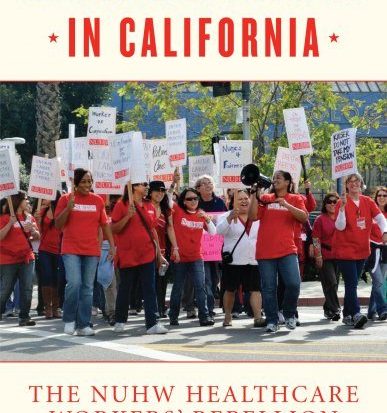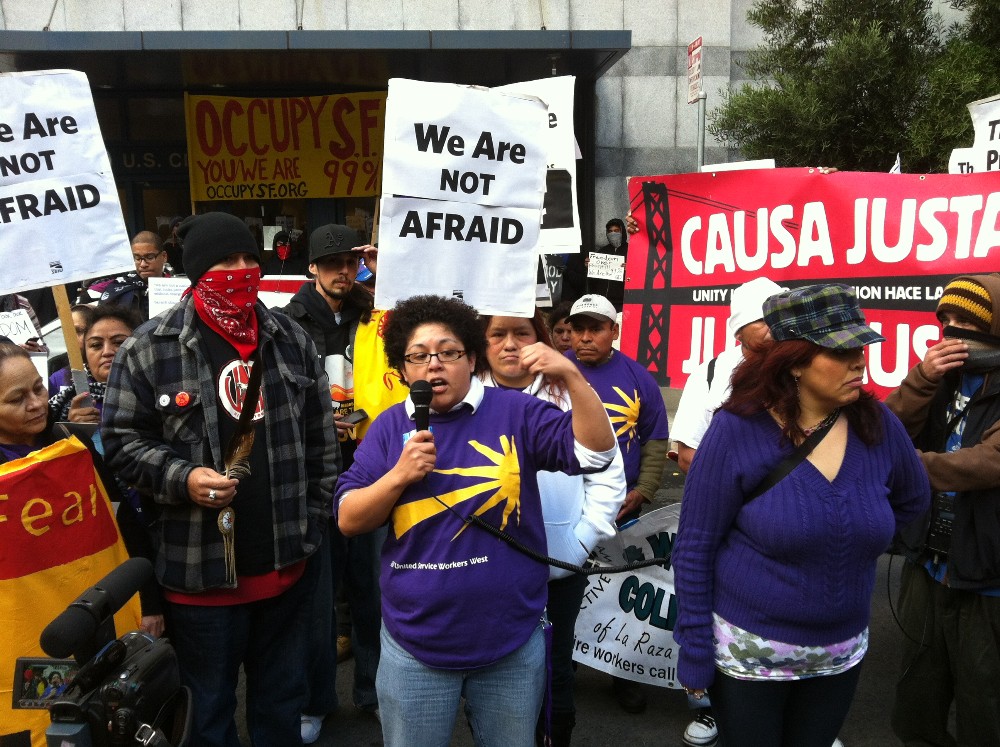
Photo above is of the book cover from http://www.pmpress.org/content/article.php/CalWinslow
Labor’s Civil War in California: The NUHW Healthcare Workers Rebellion does a phenomenal job of bringing working people’s struggles to life. It is the story of homecare, nursing home and hospital workers in Fresno and throughout California who are standing up for economic justice and a democratic union. This struggle, much of which has been taking place right here in Fresno, affects us all and will have a profound impact on the political landscape for years to come. You absolutely have to read this book!
Cal Winslow’s relatively small book (121 pages) is about the Service Employees International Union (SEIU) and why it attacked and destroyed the 150,000-member United Healthcare Workers (UHW) union, which represents thousands of workers in Fresno and the Central Valley. To understand the origins of SEIU’s war on the workers, Winslow takes us back a couple of years to when SEIU President Andy Stern implemented a strategy with nursing home employers that led to some of those facilities becoming unionized.
SEIU’s “alliance” with the bosses guaranteed the nursing home businesses more profit and stipulated that the newly organized workers would not strike or ask for a raise if it would put the employer at an economic disadvantage. The agreement gave employers “exclusive rights to manage the business,” that is, the standard management’s rights clause for power over the entire work process.
The nursing home employers, in exchange for these guarantees, agreed to a neutrality agreement that allowed SEIU to organize some of their facilities. The nursing home workers did not play a role in developing the agreement; this union organizing was done from the top down. No wonder some of the workers saw this collaboration between their employers and union officials as resulting in a bosses union.
The members and leadership of the UHW, which was a part of SEIU at the time, objected to this organizing model and soon found themselves targeted by Stern and the (SEIU) International. UHW’s organizing model had always been bottom-up; their members ran the union and elected their leadership. The business unionism of the International, which sought to grow at any cost, was at the center of what resulted in the International taking over UHW in January 2009.
The resistance to that takeover is dramatically told by Winslow, as he describes UHW members being evicted from their own union hall. SEIU fired the elected leadership of UHW and moved on to attack its own members who supported a democratic union, many times working with the bosses to have workers fired.

Fresno: SEIU’s Vietnam
The first major challenge of this takeover happened in Fresno when 10,000 homecare workers voted on whether to stay with SEIU or join the National Union of Healthcare Workers (NUHW), which was formed from the ashes of the old UHW. SEIU sent in 1,000 staff members, mostly from outside of California. SEIU spent $10 million and its head of the Fresno campaign, Dave Regan, promised “an old school ass-whipping” and said that they would “drive a stake through the heart of this thing called NUHW.”
Their tactics, according to Carlos Martinez who worked on the campaign for SEIU, included threatening workers with deportation, stealing ballots of members who voted for NUHW and intimidating members by telling them they would lose their job if they did not vote for SEIU. Martinez said he even marked members’ ballots for them.
NUHW had about 150 mostly volunteer organizers and members working on the Fresno election. Although it is impossible to know what the result would have been in a fair election, SEIU came out ahead by less than 200 votes out of the 6,000 votes cast. The election results have been contested, and NUHW is hoping for a new election. Since the election in June 2009, SEIU has largely abandoned Fresno’s homecare workers. Homecare worker wages have been reduced to minimum wage from $10.50 an hour. In other words, homecare workers represented by SEIU are now paying union dues yet are only earning minimum wage.
San Francisco writer Randy Shaw, quoted in this book, compared SEIU’s Fresno campaign to “carpet bombing” and General Curtis LeMay’s infamous strategy of “total war” in Vietnam. The point here, Shaw asserted, is that “the campaign left its opposition unvanquished and likely better positioned than SEIU to win future elections.”
The Struggle Continues
Since the Fresno election last summer, NUHW has been winning victory after victory in hospitals throughout the state. In January 2010, in the first elections allowed at Kaiser in southern California, workers, volunteers and healthcare workers managing their own campaigns defeated SEIU-UHW by choosing NUHW in three crucial representational elections. Nurses at Kaiser Sunset voted 20 to one for NUHW. Psychiatric and social workers and healthcare professionals voted for NUHW by more than four to one.
In May 2010, more than 600 University of Southern California (USC) Hospital workers voted in NUHW in a two-day election that capped a months-long battle between caregivers, hospital management and the SEIU. “We’ve taken back our hospital,” said Noemi Aguirre, a respiratory therapist at the hospital. “It’s such an incredible feeling to know we have a voice again, that we have the strength we need to stand up for our patients and for ourselves.”
The struggle began when a majority of union workers at the hospital decided to switch unions from SEIU to the member-led NUHW, and the National Labor Relations Board (NLRB) scheduled an election. In elections to choose between unions, a “no union” option is added to the ballot automatically.
The pitched battle took a bizarre turn when the incumbent union, SEIU, withdrew representation from the workers and took hospital management’s side, actually encouraging their supporters to vote “no union” and give up their rights, wages and benefits.
“I couldn’t believe it when my SEIU rep told me to vote ‘no union,'” said Anthony Gallina, a patient care technician for 13 years who had planned to vote for SEIU. “It doesn’t make sense that someone who was supposed to be on our side would want us to give up everything and go non-union.” The final vote at USC Hospital was 393 for NUHW and 122 for “no union.”

Kaiser facilities in California will be the next battleground (see Cal Winslow’s article on page 1) in this struggle between business unionism, represented by SEIU, and what many progressives refer to as social justice unionism. Elections at dozens of Kaiser hospitals throughout the state will take place later this summer. The outcome of these elections will have a profound impact on the workers, who have the opportunity to reclaim their union and move it in a more democratic direction by voting for NUHW.
But the impact of these elections will be felt throughout the political landscape here in Fresno. A progressive union (NUHW) would have the resources to affect our future by helping to elect progressive candidates and by supporting grassroots movements for social and economic change. An SEIU win would have a catastrophic impact on the progressive community.
If you want to understand the issues involved in this struggle and the context of the upcoming Kaiser election, you really need to read this book. Winslow presents us with the gift of our own history. This is our collective story about events that are shaping our lives.
NUHW leader Angela Glasper sums up what I believe to be the essence of the book when she said, “We had rights in UHW, they’ve taken them away.” Glasper, who works at Kaiser in Antioch, continues, “We fought for them; we won them. What is the use of having a union if it acts just the same as the company? SEIU, Kaiser, they’re both against the workers. We won’t stand for this. We don’t need another boss, one is enough. I was born and raised in Tupelo, Mississippi. I’ve had to fight for my rights all my life. I’m not going to stop now.”
What Other Readers Had to Say
“The NUHW leadership and staff have fought valiantly over the years to win the highest standards in wages, benefits, and quality representation for workers both on the job, in the community, and in the legislature. Having worked with them for many years and witnessed their courageous struggle, I honor their important movement to maintain the honesty and integrity of their democratic labor organization as the newly named NUHW. This book has a lot of valued lessons for all who yearn for justice for working people. I urge everyone to read it.” -Dolores Huerta, first vice president emerita and co-founder, United Farm Workers
“One of the untold stories of the American labor movement over the past ten years has been the transformation of the once progressive Service Employees International Union into a twenty-first-century version of business unionism, its leaders allied to corporate and neoliberal interests from both major political parties. Cal Winslow offers a unique glimpse into this heartbreaking tragedy and how rank-and-file workers are fighting back.” -Juan Gonzalez, New York Daily News columnist and co-host of Democracy Now!
To purchase the book go to http://www.pmpress.org/content/article.php/CalWinslow
